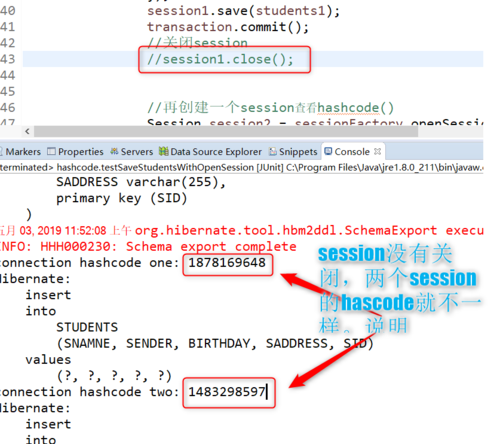-

- qq_今山_0 2019-11-24
openSession与getCurrentSession的区别
-
截图0赞 · 0采集
-

- 羅九 2019-08-27
- 两种获得session对象方法的比较
-
截图0赞 · 0采集
-

- Uestc_L 2019-06-19
openSession() 需要手动关闭(session.close())不然一直消耗 connection 资源最后连接溢出
getCurrentSession() 每次提交事务后会自动关闭 session,也就释放了 connection 资源,每次连接的 connection 都是同一个 connection 对象,connection 对象的 hashCode 相同
- 0赞 · 0采集
-

- qq_驭不凡_0 2019-05-03
session没有关闭

session关闭

- 0赞 · 0采集
-

- 张小y 2019-04-19
openSession()与getCurrentSession()的区别:
openSession不会自动关闭连接,当会话开启较多时,会建立较多的连接对象,导致数据库连接池溢出;每次创建的Session对象不同
getCurrentSession 会自动关闭连接,相当于单例设计模式,每次使用的同一个Session对象
-
截图0赞 · 0采集
-

- 总有民女想推朕 2019-04-13
getCurrentSession是获取已有对象
openSession每次都会新建对象
- 0赞 · 0采集
-

- 总有民女想推朕 2019-04-13
getCurrentSession 在事务提交或回滚后会自动关闭
openSession需要手动关闭
- 0赞 · 0采集
-

- 努力向上啊 2019-03-18
观察不手动关闭session的后果,根据hashcode判断是不是同一个连接,显然,两次的hashcode值不一样。
-
截图0赞 · 0采集
-

- 努力向上啊 2019-03-18
openSession与getCurrentSession的区别,我认为getCurrentSession要比openSession好,因为前者会自动关闭,不会导致连接池溢出,并且每次使用都是使用先用的对象;而后者则每次使用都需要创建心的对象,对内存的开销大,影响性能
-
截图0赞 · 0采集
-

- 有一种成熟叫认怂 2019-03-03
高版本mysql需要明确标识连接是否使用ssl;
且符号&必须改为实体字符&
<property name="connection.url">jdbc:mysql:///hibernate?useUnicode=true&characterEncoding=UTF-8&useSSL=false</property>- 0赞 · 0采集
-

- 慕雪0222781 2019-03-02
session详解
-
截图0赞 · 0采集
-

- 慕粉3796387 2018-11-01
openSession()与getCurrentSession()的区别:
openSession不会自动关闭连接,当会话开启较多时,会建立较多的连接对象,导致数据库连接池溢出;每次创建的Session对象不同
getCurrentSession 会自动关闭连接,相当于单例设计模式,每次使用的同一个Session对象
- 0赞 · 0采集
-

- qq_袮D影孑_03909390 2018-08-24
两个的区别
-
截图0赞 · 0采集
-

- 慕圣6698645 2018-08-07
单例模式(Singleton Pattern):确保某一个类只有一个实例,而且自行实例化并向整个系统提供这个实例,这个类称为单例类,它提供全局访问的方法。单例模式是一种对象创建型模式。
单例模式有三个要点:一是某个类只能有一个实例;二是它必须自行创建这个实例;三是它必须自行向整个系统提供这个实例。
单例模式是结构最简单的设计模式一,在它的核心结构中只包含一个被称为单例类的特殊类。-
截图0赞 · 0采集
-

- 慕圣6698645 2018-08-07
openSession与getCurrentSession的区别
-
截图0赞 · 0采集
-

- 楼下小黑啊 2018-07-05
hibernate-openSession和getCurrentSession的区别
-
截图0赞 · 0采集
-

- 灯泡啊 2018-06-30
hibernate-openSession与getCurrentSession的区别
-
截图0赞 · 0采集
-

- 慕九州1241956 2018-06-27
session1.doWork(new Work() { @Override public void execute(Connection conn) throws SQLException { System.out.println("session1_hashCode:" + conn.hashCode()); } });
会自动关闭session
-
截图0赞 · 0采集
-

- 慕九州1241956 2018-06-27
获取session对象 1、openSession 2、getCurrentSession 如果使用getCurrentSession需要在hibernate.cfg.xml文件中进行配置 本地事务(JDBC事务) <propertyname="hibernate.current_session_context_class">thread</property> 使用全局事务(jta事务) <propertyname="hibernate.current_session_context_class">jta</property> openSession和getCurrentSession的区别 1、getCurrentSession在事务提交或者回滚之后会自动关闭,而openSession需要你手动关闭。如果使用openSession而没有手动关闭,多次之后会导致连接池溢出。 2、openSession每次创建的都是一个新的Session对象,而getCurrentSession使用现有的Session对象。
- 0赞 · 0采集
-

- qq_杀意隆_0 2018-05-08
getcurrentsession会自动关闭session
-
截图0赞 · 0采集
-

- qq_杀意隆_0 2018-05-08
不关闭session可造成连接池溢出
-
截图0赞 · 0采集
-

- qq_杀意隆_0 2018-05-08
opensession每次创建的都是新对象
-
截图0赞 · 0采集
-

- qq_杀意隆_0 2018-05-08
getcurrentSession相当于单例模式
-
截图0赞 · 0采集
-

- qq_杀意隆_0 2018-05-08
openSession要手动关闭
-
截图0赞 · 0采集
-

- chr1sgong 2018-04-12
openSession()与getCurrentSession()的区别
-
截图0赞 · 0采集
-

- williamsonswl 2018-03-09
- openSession与getCurrentSession的区别
-
截图0赞 · 0采集
-

- 月中的灯光 2018-02-08
- opensession用起来方便,但是一定要记得close,保证不会读写溢出
- 0赞 · 0采集
-

- 慕瓜程 2018-02-07
- openSession与getCurrentSession的区别
-
截图0赞 · 0采集
-

- 森豪Steven 2018-01-29
- openSession与getCurrentSession的区别
-
截图0赞 · 0采集
-

- qq_何足道_1 2017-12-26
- session
-
截图0赞 · 0采集





















